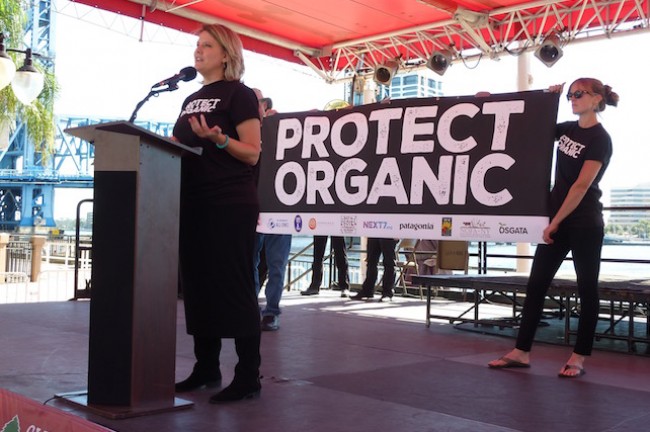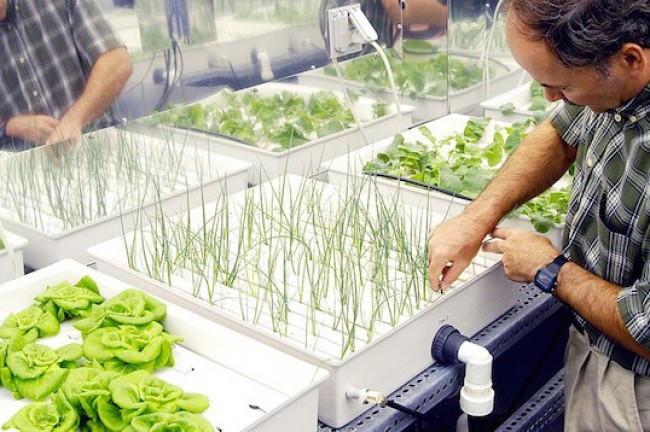
Organic Insider Newsletter Archive
Easily search through our newsletters, by keyword or topic


The Organic Trade Association Warns its Members that the Regenerative Organic Certification Presents a "Serious Risk" to the USDA Organic Label
As the Regenerative Organic Certification (ROC) is set to formally enter the marketplace in 2018, a draft message released by the Organic Trade Association raises the question whether the two organizations are headed for a collision.

With the NOSB Refusing to Ban Hydroponics from Organic, Opinions Vary as to What is Next
With the National Organic Standards Board refusing to ban hydroponics in organic, the logical question is what comes now. Seeking answers amidst a sea of different rumors, I reached out to a handful of leaders and organizations in the industry who have been fighting to remove hydroponics from organic certification. Here is what they had to say.

Why The Food and Farm Act is Exactly What We Need Right Now
With the major seed and chemical companies having controlled agricultural policy in the U.S. for decades, mostly to the detriment of the health of American citizens, U.S. Representative Earl Blumenauer (D-OR) aims to change that with his recently introduced piece of legislation called the Food and Farm Act.

The First-Ever Regenerative Earth Summit: A Shared Goal......But Major Philosophical Differences Remain
The first-ever Regenerative Earth Summit: Food+Climate+Culture was held in Colorado last week. Here is a full recap of what took place and the major themes discussed.

Maintaining the Integrity of Organic Means Little to the USDA
After the National Organic Standards Board meeting in Jacksonville, it became painfully clear that the USDA is failing our industry. We can recap what happened in Florida and speculate where we go from here.

A Discussion About Organic Food Packaging with Becky Nelson
What the box, bottle, bowl, bag, wrapper or pouch looks like and feels like plays a critical role in building brand loyalty, and organic companies should never underestimate just how attached consumers become to a brand’s packaging. Becky Nelson, who works with many of top brands in the industry at Bex Brands, gives her take on best practices,...

The True Cost of Factory Farming and Industrial Agriculture Does Not Show up at the Supermarket
In a report by The International Panel of Experts on Sustainable Food Systems and The Global Alliance for the Future of Food, the case is made that the industrial food system is largely to blame for our "staggering" health care costs, which includes the $760 billion yearly cost of obesity and $673 billion yearly cost of diabetes. Learn how the...

Investigative Journalist Carey Gillam Travels to Europe to Testify Against Glyphosate and Monsanto’s Deception
Investigative journalist Carey Gillam, author of the excellent book Whitewash: The Story of a Weed Killer, Cancer, and the Corruption of Science, testified in front of a European Union panel about glyphosate. What she encountered should give us a semblance of optimism.

Led by Patagonia, Organic Food Companies are Inserting Themselves into the Hydroponics Controversy
What Patagonia is doing to galvanize the industry around the very important hydroponics issue and which companies are supporting this initiative.

How the USDA Handled the Aurora Organic Dairy Investigation is Very Damaging to the Industry and Consumers
With the USDA announced that it had completed a months-long investigation of Aurora and closed the complaint, saying that the USDA found no "clear and substantive evidence that the existing organic regulations" on grazing were violated. According to The Washington Post, the USDA said it reviewed grazing records from last year but did not share...

A Conversation with the Country’s Most Influential Food Business Journalist
After 30 years at The New York Times, food business reporter Stephanie Strom has stepped down. Widely regarded as the most influential journalist in the space, Stephanie talks about what it was like to cover the sector from inside the NYT, if she faced any pressure to cover GMOs in a certain way, and what companies should know when pitching...

Regenerative Agriculture and Plant-Based Foods Take Center Stage
I recently returned from a fantastic few days at Natural Products Expo East in Baltimore and thought it was the best Expo East I have been to in many years. In my recap, I talk about the show's key trends that really stood out.

If you care about organic, then you MUST visit the Rodale Institute
This past weekend, I was in Pennsylvania for a farm tour and to attend the 7th annual Organic Pioneer Awards dinner at the Rodale Institute. In all of my years covering the organic industry, this was one of the most special days that I have experienced. If you've never been to Rodale and you love organic, absolutely make a visit to this place....

Lower Prices at Whole Foods Are a Double-Edged Sword
As the Internet was abuzz last week with prices at Whole Foods down by as much as 43%, let’s remember one thing -- there is no free lunch. In today's Organic Insider, we take a look at what this margin pressure means for the industry and how competitors, such as Lidl, are making lower prices work.

An Inside Look at the Organic and Natural Beauty Space
With organic and natural personal care category exploding, Indie Beauty Expo is my favorite showcase for learning what is new and interesting in the space. Here is the best of what I found at last week's show in New York City.

Transparency, E-Commerce, and Educating Shoppers About "Organic" are of Paramount Importance
The Food Marketing Institute recently released its 2017 U.S. Grocery Shopper Trends report, and after surveying more than 2,000 adults, it compiled some fascinating information about where they shop, how they shop, and what they value the most. Let's just say that the organic industry has A LOT of work left to do.

As Both an Industry Leader and a Vegan, David Bronner Shares an Important Perspective on the Impossible Burger
David Bronner is the CEO of Dr. Bronner’s and one of the most influential and actively engaged leaders in the organic industry. When it comes to taking a stand on important social and environmental issues, I do not believe there is another company in our industry that has stepped up more than Dr. Bronner’s. The company has given millions to...

President John Foraker Steps Away from Annie's After 18 Years
As one of the most important and beloved leaders in the organic food industry, John Foraker stepped down last week from Annie's, and the news caught a lot of us by shock. In tody's column, I spoke with John and he gave us some clues as to what is coming next.

Brandless is Sending a Very Important Message to Organic Food Brands
Armed with $50 million from Silicon Valley venture capitalists, Brandless sells organic and Non-GMO food and household items, almost all of which are $3. With this powerful new entrant into the market, there is a lot that brands can learn from this company.

President Trump's Impact on Organic Food and What the Future Holds
With the first six months of the Trump administration behind us, I wanted to take a look at how organic food has been impacted under this new president. While there has been an abundance of negatives, there have been a few positives as well -- surprisingly.

All Forms of Genetic Engineering Must Require Labels
As the USDA prepares to roll out its GMO-labeling law, which goes into effect in 2018, it is seeking input from stakeholders and has posed 30 questions regarding key issues of this bill. In my conversation with Michael Hansen, PhD, here are the things that this new law should address.

Normally, Organic Insider goes out on Tuesdays but since the USDA asked that the comments for its GMO-labeling bill be submitted by tomorrow, I wanted to get you my synopsis of these comments as soon as possible, so you can make the deadline. Be on the lookout for an email tomorrow, instead of Tuesday.

Genetically-Engineered Trees and Genetically-Engineered Moths Could Soon Be Invading Our Environment
Aside from the massive fraud issues that have surfaced as of late, we are now facing the very scary prospect of genetically-engineered trees and genetically-engineered moths pervading the American agricultural landscape, whose impact would be irreversible and catastrophic. Here is a quick recap on each and where things stand.
